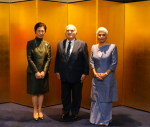You are here
The silence of the Republican lambs
Oct 30,2019 - Last updated at Oct 30,2019
NEW YORK — In the 1960s, the dissident poet Alexander Galich wrote about the mute complicity of Soviet apparatchiks in Joseph Stalin’s crimes, notably the Great Purges in which millions were detained or died in the Gulag. “Those who were silent became the bosses, because silence is gold,” Galich wrote. “Keep silent, you will be on top.”
I never would have imagined that those lines also could resonate in the United States. But President Donald Trump has changed everyone’s perception of what is possible.
Even as Trump’s presidency fast approaches the abyss, leading members of the Republican Party have stayed largely silent. They include not only Senate Majority Leader Mitch McConnell and fellow Senator Lindsey Graham, but also former President George W. Bush, James Baker and Dick Cheney. Their loyalty to “Republican values” entrenched since the Ronald Reagan era, low taxes, light regulation and social conservatism, has made them complicit in the harm that the Trump administration is inflicting on America and the world.
Those Republican values have failed to bring economic benefits to ordinary Americans in recent decades. Moreover, the 2003 US-led invasion of Iraq under Bush badly damaged America’s international standing, and nationalist governments in Russia, Turkey, Hungary and elsewhere increasingly questioned the morality of US global leadership.
Under Trump, a man with no moral compass whatsoever, the Republicans’ policy priorities have remained the same, but any remaining semblance of “values” has all but vanished. Trump’s betrayal of allies, denial of Russia’s interference in the 2016 US presidential election, affinity for neo-Nazis and white supremacists, and inability to distinguish his office from his business should deter any Republican from serving in or defending this administration. Yet, even those officials with apparent concerns about Trump have ended up helping to normalise his presidency.
In September 2018, Anonymous, allegedly a senior Trump administration official, wrote an op-ed in The New York Times declaring that “I am part of the resistance”, as if that were supposed to assuage our concerns about Republican silence. “To be clear,” Anonymous wrote, “ours is not the popular ‘resistance’ of the left. We want the administration to succeed and think that many of its policies have already made America safer and more prosperous.” But the prosperity claim is questionable, and Trump’s disastrous foreign policy, even more than George W. Bush’s, has cost America the world’s trust and respect.
Many also had hoped for resistance from the several former US military leaders who have served in the Trump administration, in particular ex-US national security advisers Michael Flynn and H.R. McMaster, former Secretary of Defence James Mattis and John Kelly, who headed the Department of Homeland Security before becoming White House Chief of Staff.
Although Flynn lasted only weeks in his role and is now a convicted felon, the other three were widely seen as the “adults in the room”, who could counterbalance Trump’s chaotic show-business instincts. They persuaded themselves that rather than trying to remove Trump from office, they could instead control him and thus perpetuate their own power. And by upholding the US system of checks and balances, they would be the saviors parachuting us all back to normalcy.
But although Trump initially called these former military men “my generals”, he later ousted them after falling out with each in turn. In the end, their complicity in the Trumpian catastrophe was not so different from the communist silence that Galich condemned, and which imposed such an enormous cost on the Soviet Union’s population. Moreover, these mostly retired former US generals and lieutenant-generals did not have to serve out of fear, as former Soviet leader Nikita Khrushchev and others had done under Stalin.
Now, finally, some of the resisters are speaking out. Anonymous, who might even be one of those generals, has written “A Warning”, touted by its publisher prior to its release in November as an “explosive” book that “offers a shocking, first-hand account of President Trump and his record”. And McMaster is writing a book scheduled for 2020 about the “gravest geopolitical challenges” of our time, in which Trump is likely to feature.
The latest Republican resister is John Bolton, the third of Trump’s national security advisers, who left the administration in September and is also allegedly working on a tell-all book. Some are now praising Bolton for expressing concern about the conduct of US policy toward Ukraine. There has even been speculation that Bolton or a protégé of his is the whistleblower who called attention to the July 25 phone call in which Trump pressured Ukrainian President Volodymyr Zelensky to investigate Joe Biden, a contender for the 2020 Democratic presidential nomination. This, however, is the same Bolton who argued for the disastrous 2003 Iraq invasion while he was serving in the US State Department.
Better late than never, some might say. Still, the recent flurry of “resistance” is more than a little late. These silent “resisters” want us to believe that they put their country first, when in fact Trump’s presidency was further dividing both the US and the world.
In the 2018 op-ed, Anonymous lamented that America had “sunk low with [Trump] and allowed our discourse to be stripped of civility”. Now, with the likes of Bolton set to become a hero, US political discourse seems to have been stripped of common sense as well.
Khrushchev, the main subject of Galich’s poem, denounced Stalin in 1956, having previously been loyal to the dictator for decades. And he owned up to his own crimes, declaring that his arms were “covered with blood up to the elbows”.
Let that be the test. Before we rush to embrace Bolton, McMaster, and others because they are now anti-Trump, let’s see if they have the courage to blame themselves for their earlier complicity.
Nina L. Khrushcheva is Professor of International Affairs at The New School. Her latest book (with Jeffrey Tayler) is “In Putin’s Footsteps: Searching for the Soul of an Empire Across Russia’s Eleven Time Zones”. ©Project Syndicate, 2016.
www.project-syndicate.org












